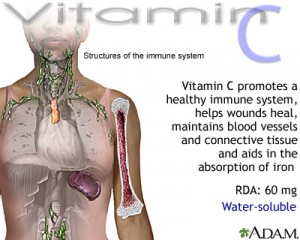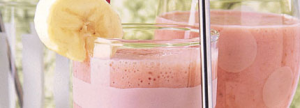All About Guava Juice
The Guava Fruit
Guava fruit is a round or pear-shaped bearing of the guava tree. Scientifically it is known as Psidium guajava L. The guava tree is small, low-growing reaching 33 feet in height with spreading branches and copper-colored bark. 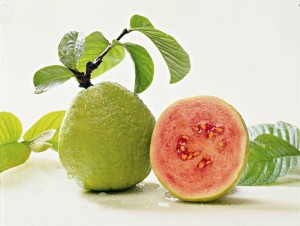 The fruit is 2-4 inches long with light yellow skin which is sometimes blushed with pink. Guava has a sweet, strong and musky odor when ripe and a flesh that is thick, juicy, white or yellowish to dark pink in color. The mid part of the flesh is slightly darker and mostly filled with tiny hard seeds. Guava belongs to the myrtle family, Myrtaceae and is one of the most cultivated fruit trees in the World.
The fruit is 2-4 inches long with light yellow skin which is sometimes blushed with pink. Guava has a sweet, strong and musky odor when ripe and a flesh that is thick, juicy, white or yellowish to dark pink in color. The mid part of the flesh is slightly darker and mostly filled with tiny hard seeds. Guava belongs to the myrtle family, Myrtaceae and is one of the most cultivated fruit trees in the World.
Guava’s Origin and Other Names
Guava is believed to originate from the warm tropical areas of Southern Mexico and Central America, but its real place of origin is uncertain since guava has been cultivated by man and even animals for a long time. Guava fruit was first introduced in Bahamas, Bermuda and Southern Florida in 1847 but it has been very common throughout all tropical areas of America and West Indies. Guava’s popularity quickly spread to different countries and continents and was soon adopted by people as a crop.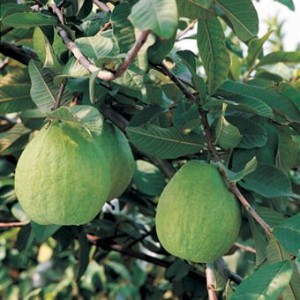
Today guava fruit has a many names. It is known as “guayaba or “guyava” in Spanish, “guyave” or “guyavier” in French and “goiaba” in Portuguese. The Hawaiians call it guava or “kuawa” while people in Guam call it “abas”. In the Philippines, it is commonly known as “bayabas”.
The Guava Juice
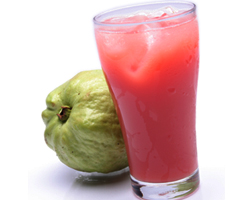 Guava, like many other fruits, improves our health with its high nutritional profile. With its delicious fragrant and sweet taste, a little addition of sugar and cold water it will turn into a very tasty and refreshing drink.
Guava, like many other fruits, improves our health with its high nutritional profile. With its delicious fragrant and sweet taste, a little addition of sugar and cold water it will turn into a very tasty and refreshing drink.
What’s in Guava Juice?
Guava contains several essential vitamins, minerals, and antioxidants such as polyphenolic and flavonoid compounds. Here are the nutrients you can get from a glass of guava juice.
Fresh Guava Nutritional Value
per 100 g
Energy: 68 KCAL
Carbohydrates: 14.3 g
Protein: 2.55 g
Total Fat: 0.95 g
Cholesterol:0 mg
Dietary Fiber: 5.4 g
Vitamins
Folates: 49 µg
Niacines: 1.084 mg
Pantothenic acid: 0.451 mg
Pyridoxine: 0.110 mg
Riboflavin: 0.040 mg
Thiamine: 0.067 mg
Vitamin C: 228 mg
Vitamin A: 624 IU
Vitamin E: 0.73 mg
Vitamin K: 2.6 µg
Minerals/Electrolytes
Sodium: 2mg
Potassium: 417 mg
Calcium: 18mg
Iron: 0.26 mg
Magnesium: 22 mg
Phosphorus: 11 mg
Zinc: 0.23 mg
Phytonutrients
Lycopene: 5204 µg
Carotene- ß: 374 µg
Health Benefits of Guava Juice
Because guava is incredibly high in vitamin C, its juice as well contains the same richness of vitamin C and other nutrients. You should know that one guava contains four times the amount vitamin C found in an average-sized orange and ten times more vitamin A than a lemon.
Guava Boosts Your Immune System
Guava is a very good source of vitamin C, the vitamin that boosts the functioning of our immune system and helps it fight diseases and infections. Even a simple cold or cough can ruin our days, right? We can avoid these common ailments by drinking guava juice or eating raw guavas regularly. You would not only experience the refreshing feeling of drinking guava juice but also help your immune system.
Prevents Colon Cancer
Because guava is not only rich in vitamin C but also very rich in fiber, it will reduce our risks of developing certain cancers especially colon cancer. Vitamin C is a form of antioxidant that fights free radicals and oxidation which are the main causes of cancer. Its high fiber content protects the mucous membranes of our colon by increasing the bulk and decreasing its exposure time to toxins. This reduces our risks to develop cancers in the stomach, larynx, esophagus and pancreas.
Makes Our Skin and Eyes Healthy and Young
Guava is an excellent source of vitamin A, flavonoids such as beta-carotene, lutein and cryptoxanthin. These vitamins and compounds are known to play big roles in maintaining skin health and fighting the effects of aging. Vitamin A and lutein are also essential in maintaining healthy vision.
Increases Skin, Bones and Blood Vessels Integrity
Because vitamin C is required for collagen synthesis, the more vitamin C in the body means the more collagen. Collagen is a protein that’s responsible for the elasticity and structure of our skin, bones and blood vessels. It is needed to maintain a strong, intact and invulnerable blood vessels, skin and bones. Guava juice is rich in vitamin C; therefore, it would help us grow more collagen in the body.
Helps Regulate Heart Function
Guava contains more potassium compared to banana per 100 g of fruit. Potassium is the electrolyte found in our body cells and body fluids that controls heart rate and blood pressure. This electrolyte helps us maintain normal heart rhythm and overall heart function including normalizing blood pressure. Guava is also rich in lycopene which is known to be the heart-friendly antioxidant and also has anti cancer properties.
How to Make the Perfect Guava Fruit Juice and a Guava Smoothie!
Ingredients:
- 120 g Guava Fruit
- 5 Tablespoons Sugar Syrup (1:1 sugar & water solution)
- 236 ml water
Instructions:
Wash and peel the guava, take only the outer flesh and central pulp minus the seeds. Use a fork to get rid of the seeds as much as possible. Mix together guava flesh, syrup and water and blend in a food processor or in a regular blender. Pour over crushed ice. If you want, add a tiny pinch of salt to the juice to get a bit of salty flavor.
Want to make your guava juice more creamy and smooth? Here’s how to make guava smoothie.
Ingredients:
- 1/2 c. guava juice
- 1 scoop vanilla ice cream or low fat yogurt
- 1 tsp. macadamia nuts, chopped
- 1/2 banana
- 4 -6 ice cubes
Instructions:
Blend all ingredients in a blender on high speed for 10 seconds. Blend until smooth and creamy. Garnish with a slice of guava before serving. Enjoy!
More Articles On Guava And Guava Juice
Best Guavas For Guava Juice And How To Choose Them
Guavas have been popular with juicers for a long time, …Guava Juice Side Effects:Can You Drink Too Much of It?
With all of the health benefits of guava juice, one …Guava Nutrition Facts
Guava Nutrition Facts Betaine 0 mg Calcium 18 mg Calories …Health Benefits of Guava Juice
With its high profile of vitamins, minerals and fiber, the …
